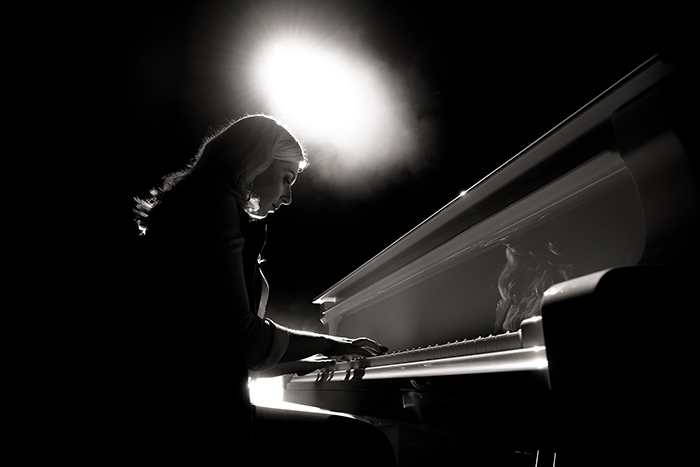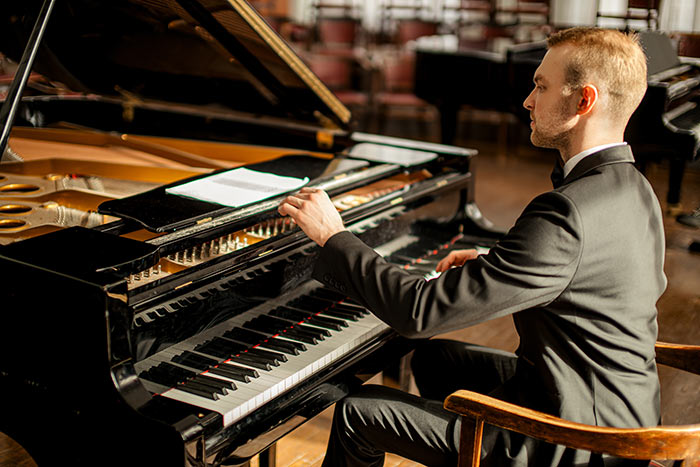Everyone has to start somewhere when learning an instrument and surprisingly a lot of beginners make the same mistakes at the beginning of their journey. As a piano teacher, here are the most common mistakes that I see being made. Have a look and see how many you do / have corrected.
Surprisingly to most people, the first mistake is usually made before the starting line. Now this may leave you thinking ‘how can you make a mistake before even starting?’ Well, usually when I talk to my students on their first lesson I get told many times that they began relying heavily on resources on the internet such as video tutorials or blogs. Now, don’t get me wrong, this isn’t entirely a bad thing to do, in fact it is a great start for you to see if you are genuinely interested enough to commit to lessons. However, by relying heavily on internet resources you skip the basics when it comes to theory and technique and this will set you back as you form bad habits that no one can correct you on which may be hard to tackle.
Video tutorials may teach you how to play your favourite songs but it will be on a very surface level. Most of the time you won’t know the names of the notes you are playing, what they look like on the score and the rhythm will be ingrained purely by ear. Very commonly notes will not be played with the ideal fingerings and most of the time aches and pains occur in the hands without the student really knowing why. Getting lessons with a teacher from the outset is a great way to understand music and will allow you to form the correct habits.
This leads on nicely to the second mistake; Only choosing and practicing well known repertoire. Of course it is great to learn pieces that you are familiar with and enjoy, that way you can show off to your family and friends how well you can play Fur Elise by Beethoven. However, if you only rely on this then a lot of the time the notes and rhythms you play are predetermined by your memory rather than your technical capabilities. You may not be reading rhythms and you may just be guessing the notes because you know how to piece sounds. This may hinder your progress so make sure that you choose both pieces that you do know, and that you haven’t heard of to get a nice balance of score reading and ear training. Who knows, maybe a new piece could turn into your new favourite.
Another noticeable mistake from beginners is the want to skip the necessary practice of scales. A lot of students do not see the importance of scales and find the practice boring so try to get away with not doing it. However, scales are a fundamental part of improvement. To understand why we should do scales, check this article: https://www.londonpianoinstitute.co.uk/why-scales/
Negative thinking gets in the way of many aspects of life and adults are way more guilty of this than children are. For some reason, as we grow up we become self critical and this can affect our progress on the piano. As we tell ourselves we are not good enough, at a certain point we start to believe it. Therefore, as a beginner you need to reassure yourself that with practice will be progress and if you are enjoying your lessons and your time playing then that is the greatest achievement after throwing yourself into the unknown.
Many beginners think that by just playing the correct notes and rhythms means they have mastered a piece but this isn’t always the case. Making use of dynamic contrasts within a piece of music will transform it and bring it to life. Cracking your technique so you can play different contrasts with ease will boost not only your confidence with your playing but also you will surprise yourself at the sound you can produce with these small adjustments.
This links in nicely with the next point; ignoring the theory and background of music. Again, beginners like to rush the process so that they get to their end goal quicker, but quicker doesn’t always mean better. If you learn your theory and understand the stylistic features within the different eras of music it means that you can relate to the deeper message of the music and ultimately you can play a more persuasive piece. Understanding that there is more to music than just the notes placed on the score will make you a better and more well-rounded musician.
The word practice is so simple and obviously a big part when learning music but if someone asked you what the most effective way to practice is would you know the answer?
If your answer was no then you are not alone. Many students believe that repeatedly playing a piece from start to end is how you should practice but, by doing that you are not fixing the issues that occur and you will most likely find that the first half of the piece is better than the second half. There are lots of different ways to practice, different things work for different people, but make sure you work with your teacher to figure out what is the most effective way for you. By becoming confident in your practice you will notice a great boost in your progress and your self-esteem within your musical journey.
This leads nicely onto the pace of which you play. Again, I have many students who love to play quickly, which is great if you have a score that is performance ready with a tempo marking that indicates a quick tempo. But, you may find that by playing too quickly before you are ready will cause you to make more mistakes and slip up more frequently whilst not giving yourself enough time to think about what is coming up in the music. It may also mean you aren’t listening to yourself so therefore in your practice can’t recognise when a mistake is made. I always say to my students that it is better to play slower and accurate than faster and inaccurate. Faster doesn’t always mean better and when they put this into practice they begin to see the growth that they make.
Lastly, do not expect too much too quickly. Music is about the journey, not the destination and it is ok to not be perfect straight away. In fact when learning music you will hardly ever be perfect as once you perfect a piece it will be time to move onto something new. If it seems difficult then you are on the right track to improvement.
So there you have it. The most common mistakes to make as a beginner. But don’t worry because you are not alone. To fix these issues, find a committed piano teacher and work on it together, you’ll be surprised at what you can achieve. Most importantly don’t give up, music can be tough sometimes but the reward is much greater.












